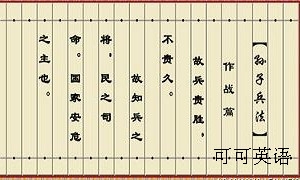作戰篇 NO.1:
孫子曰: 凡用兵之法,馳車千駟,革車千乘,帶甲十萬,千里饋糧,則內外之費,賓客之用,膠漆之材,車甲之奉,日費千金,然后十萬之師舉矣。
這句啥意思:
孫子說:要興兵作戰,需做的物資準備有,輕車千輛,重車千輛,全副武裝的士兵十萬,并向千里之外運送糧食。那么前后方的軍內外開支,招待使節、策士的用度,用于武器維修的膠漆等材料費用,保養戰車、甲胄的支出等,每天要消耗千金。按照這樣的標準準備之后,十萬大軍才可出發上戰場。
英文這么說:
Sun Tzu said: In the operations of war,where there are in the field a thousand swift chariots,as many heavy chariots, and a hundred thousand mail-clad soldiers, with provisions enough to carry them a thousand li, the expenditure at home and at the front,including entertainment of guests, small items such as glue and paint, and sums spent on chariots and armor,will reach the total of a thousand ounces of silver per day.Such is the cost of raising an army of 100,000 men.

《作戰篇與社會生活》
主要論述的是速戰速決的進攻戰略,重點提出“兵貴勝,不貴久”的速勝思想。 投資者進入市場交易的主要目的就是賺錢,所以投資者在交易的過程中要時刻記住“外匯交易貴在賺錢,不貴在操作手法的巧妙和復雜”這個重要原則。一個交易操作方法有沒有用要看他最后能不能給投資者帶來利潤,能否讓投資者存活下來,而不是看他的“工巧”。我們大家在外匯市場求的是利,投資者在選擇操作方法的時候千萬要注意避免那些華而不實的方法。復雜的未必是好的,有時簡潔明了的操作方法才會帶給投資者最多的利益。











